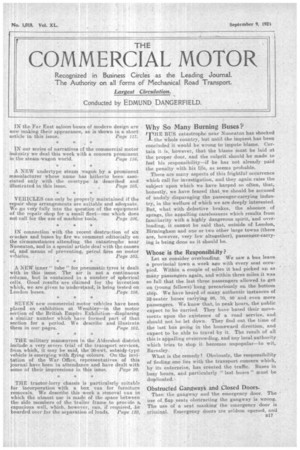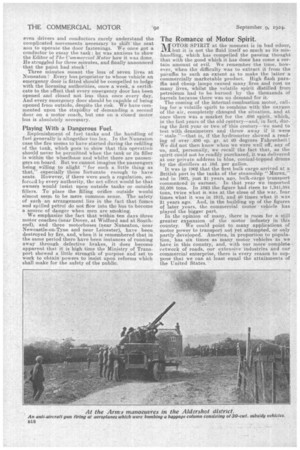Why So Many Burning Buses?
Page 1

Page 2

If you've noticed an error in this article please click here to report it so we can fix it.
MILE BUS catastrophe near Nuneaton has shocked the whole country, but until the inquest has been concluded it would be wrong to impute blame. Certain it is, however, that the blame Must be laid at the proper door, and the culprit should be made to feel his responsibility—if he has not already paid the penalty with his life, as seems probable. There are many aspects of this frightful occurrenee which call for investigation, and they again raise the subject upon which we have harped so often, that, honestly, we have feared that we should be accused of unduly disparaging the passenger-carrying industry, in the welfare of which we are deeply interested. But, what with defective brakes, the absence of sprags, the appalling carelessness which results from familiarity with a highly dangerous spirit, and overloading, it cannot be said that, outside of London, Birmingham and one or two other large towns (there are, however, very few altogether), passenger-carrying is being done as it should be.
Whose is the Responsibiiity ? Let us consider overloading. We saw a bus leave a provincial town a week ago with every seat occupied. Within a couple of miles it had picked up as many passengers again, and within three miles it was so full that the last three passengers allowed to get on (young fellows) hung precariously on the bottom step. We have heard of many authentic instances of 32-seater buses carrying 60, 70, 80 and even more passengers. We know that, in peak hours, the public expect to be tarried. They have based their movements upon the existence of a road service, and should not be let down. They find out the time of the last bus going in the homeward direction, and expect to be able to travel by it. The result of all this is appalling overcrowding, and any local authority which tries to stop it becomes unpopular—to wit, Barnsley. What is the remedy? Obviously, the responsibility of finding one lies with the transport concern which, by ifs enterprise, has created the traffic. Buses in busy hours, and particularly " last buses " must be duplicated.'
Obstructed Gangway's and losed Doors. Then the gangway and the emergency door. The use of flap seats obstructing the gangway is wrong. The use of a seat masking the emergency door is criminal. Emergency doors are seldom opened, and even drivers and conductors rarely understand the complicated movements necessary to shift the seat anti to operate the door fastenings. We once got a conductor to essay the task : he was anxious to show the Editor of The Commercial Motor how it was done. He struggled for three minutes, and finally announced that the paint had stuck ! Three minutes meant the loss of seven lives at Nuneaton ! Every bus proprietor to whose vehicle art emergency door is fitted should be compelled to lodge with the licensing authorities, once a week, a certificate to the effect that every emergency door has been opened and closed not less than once every day. And every emergency door should be capable of being opened from outside, despite the risk. We have commented upon the stupidity of demanding a second door on a motor coach, but one on a closed motor bus is absolutely necessary.
Playing With a Dangerous Fuel. Replenishment of fuel tanks and the handling of fuel generally is altogether too lax. In the Nuneaton case the fire seems to-have started during the refilling of the tank, which goes to show that this operation should never be permitted when the tank or its filler is-within the wheelbase and whilst there are passengers on board. But we cannot imagine the passengers being willing to alight "for such a little thing as that," especially those fortunate enough to have seats. However, if there were such a regulation, enforced by every authority, the net effect would be that owners would insist upon outside tanks or outside fillers. To place the filling orifice outside would almost seem to be mere common sense. The safety of such an arrangement Bea in the fact that fumes and spilled petrol do not flow into the bus to become a source of danger when men are smoking. We emphasize the fact that Within ten days three motor coaches (near Dover, at Widford and at Southend), and three motorbuses (near Nuneaton, near Newcastle-on-Tyne and near Leicester), have been destroyed by fire, and, when it is remembered that in the same period there have been instances of running away through defective brakes, it does become apparent that it is high time the Ministry of Transport showed a little strength of purpose and set to work to obtain powers to insist upon reforms which shall make for the safety of the public.
The Romance of Motor Spirit.
MOTOR SPIRIT at the moment is in bad odour, but it is not the fluid itself so much as its mishandling, which has compelled the passing thought that with the good which it has done has come a certain amount of evil. We remember the time, how
ever, when the difficulty was to extract it from the
paraffin to such an extent as to make the latter a commercially marketable product. High flash para
ffin and cheap lamps caused many fires and cost us many lives, whilst the volatile spirit distilled from petroleum had to be burned by the thousands of barrels because there was no demand for it,
The coming of the internal-combustion motor, calling for a volatile spirit to combine with the oxygen of the air, completely changed the situation, and at once there was a market for the .680 spirit, which, . in the last years of the old century—and, in fact, during the first year or two of this century—we used to test with densimeters and throw away if it were " stale "—that is, if the hydrometer showed a read ing of over .680 sp. gr. at 60 degrees Fahrenheit!
We did not then know when we were well off, any of us, and, personally, we recall the fact that, as the
spirit could not be readily purchased, it was delivered at our private address in blue, conical-topped drums by the distillers at irld. per gallon. It was in 1902 that the first bulk cargo arrived at a British port in the tanks of the steams-hip "Murex," and in 1903, just 21 years ago, bulk-cargo 'transport commenced in earnest. In that year we imported 33,008 tons. In 1923 the figure had risen to 1,341,564 tons, twice what it was at the close of the war, four • times what it was in 1913, and 40 times what it was 21 years ago. And, in the building up of the figures of later years, the commercial motor vehicle has pla,:yed the bigger part. In the opinion of many, there is room for a still greater expansion of the motor industry in this
country. We could point to many applications of motor power to transport not yet attempted, or only partly developed. America, in proportion to popula tion, has six times as Many motor vehicles as we have in this country, and, with our more complete network of roads, our extensive industries and our
commercial enterprise, there is every reason to suppose that we can at least equal the attainments of the United States.
































